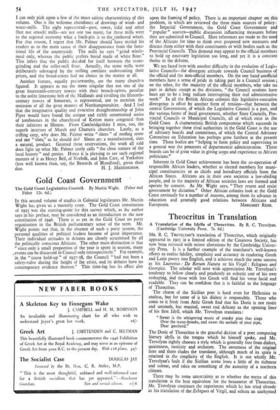Gold Coast Government '
IN this second volume of studies in Colonial legislatures Mr. Martin Wight has given us a masterly essay. The Gold Coast constitution of 1925 was the starting-point for this survey which, as the author says in his preface, may be considered as an introduction to the new constitution of 1946. There is as yet in the Gold Coast no party organisation in the British parliamentary sense of the term. Mr. Wight points out that, in the absence of such a party system, the personal qualities of political leaders become of great importance. Their individual attitudes in debates are closely scrutinised by all the politically conscious Africans. The other main distinction is that " since only a small proportion of the year is spent in session, many . events can be discussed in Council only retrospectively." For example, in the " cocoa hold-up " of 1937-38, the Council " had not been a safety-valve during the height of the crisis, and its debates have no contemporary evidence thereon." This time-lag has its effect also upon the framing of policy. There is an important chapter on this problem, in which are reviewed the three main sources of policy: the Imperial Government, the Gold Coast Government and " popular ' sources—public discussion influencing measures before they are submitted to Council. Here references are made to the need of the Africans for time to think over proposed new measures and discuss them either with their constituents or with bodies such as the Provincial Councils. This demand may appear to the official members to hold up necessary legislation too long, and yet it is a constant theme in the debates.
We are faced here with another difficulty in the evolution of Legis- lative Councils—the divergent attitude towards Council business of the official and the non-official members. On the one hand, unofficial members have a sense of pride in taking part in a Council session ; on the other, for the majority of the official members, who take no part in debate except at the divisions, " the Council sessions have been apt to be a long tedium interrupting their real administrative work." In all the British African colonies this legislative-executive divergence is offset by another form of tension—that between the central Government, of which the Legislative Council is a part, and the various forms of local government, whether State Councils, Pro- vincial Councils or Municipal Councils, all of which exist in the Gold Coast. A characteristic British compromise which succeeds in bringing together these rival authorities in the Gold Coast is the use of advisory boards and committees, of which the Central Advisory Committee on Education has perhaps gone furthest at the present time. These bodies are "helping to form policy and supervising in a general way the processes of departmental administration. These boards can be of great value in giving scope and experience to African politicians."
Inherent in Gold Coast achievement has been the co-operation of responsible African leaders, whether as elected members for muni- cipal constituencies or as chiefs and hereditary officials from the African States. Africans are in their own societies a law-abiding people, and in the majority of African societies laws are formed and operate by consent. As Mr. Wight says, " They resent and resist government by dictation." Other African colonies look at the Gold Coast enviously for a number of reasons, among them its advance in education and generally good relations between Africans and


































 Previous page
Previous page